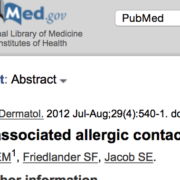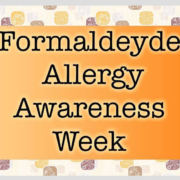“I can’t find a bra – my underwear make me itch!” – living with formaldehyde allergy
At the final patch test reading visit, once a positive reaction has been found, clinical relevance to the current dermatitis must be determined… then safe alternatives found… a challenge for the formaldehyde allergic person is clothing (textiles)…
Back in 2008, Dr. Andrew Scheman (Director of the Contact Allergen Management Program for the ACDS) led out a partnership initiative to form a collaborative [namely the American Contact Alternatives Group -ACAG] which would work to find and share safe alternatives with each other and our patients, resulting in this manuscript:
Scheman A1, Jacob S, Zirwas M, Warshaw E, Nedorost S, Katta R, Cook J, Castanedo-Tardan MP. Contact Allergy: alternatives for the 2007 North American contact dermatitis group (NACDG) Standard Screening Tray. Dis Mon. 2008 Jan-Feb;54(1-2):7-156.
http://www.ncbi.nlm.nih.gov/pubmed/18215657
Since then, the ACAG collaborative has continued to work together and share with each other resources we find…
Here is a resource from CottoniqueTM:
“Each country has its own manufacturing standards for acceptable levels for formaldehyde resins. A low indicator of formaldehyde releasing resin would be 75 ppm which is the Japanese standard, the US standard is somewhere near 300ppm, quite a difference.
Fabrics safe to wear: 100% silk, 100% linen (if it wrinkles easy), 100% polyester, 100% acrylic, 100% nylon, spandex, flannel (soft), wool (may cause irritation) and denim.
Do not wear these fabrics: Permanent press, wrinkle resistant, color-fast, stain-resistant, blends (including rayon, polyester-cotton), corduroy or shrink-proof wool.
It is suggested that you read the labels in your existing clothing and separate them in your closet so you will know what’s safe to wear. Always opt for loose fitting clothing since friction and perspiration can cause the condition to flare. Read the labels in any new clothing before you purchase. Clothes made in Japan are the safest and companies that sell clothes in Japan also have to meet the Japanese standard.
Companies that meet the Japanese standard: GAP, Old Navy, Banana Republic, Liz Claiborne, Eddie Bauer, Cuddle Duds and Levi Strauss. There may be others but these were on the list from the American Contact Dermatitis Society.”
Blog from Cottonique [https://www.cottonique.com/blogs/blog/2424702-the-contact-dermatitis-and-clothing-connection] https://www.cottonique.com
The Dermatitis AcademyTM has no financial or relevant relationship with CottoniqueTM, nor certifies their wares.





